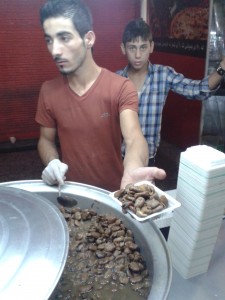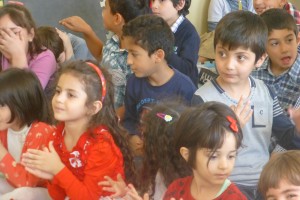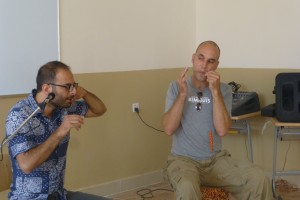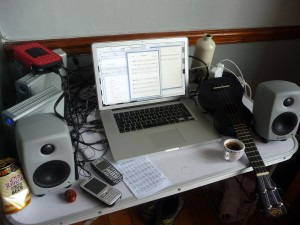October 2013 saw another episode of Elephant Songs, my ongoing project in which musicians from different backgrounds meet and create original music together. This time, the backdrop was Suleymaniyah, the economic heart of Iraqi Kurdistan. An anonymous development aid NGO commissioned me to invite musicians from Iran (where I spent a few months on my drumbiker trip in 2012) and bring them together with colleagues in Suleymaniyah. The resulting line-up could be called a worldjazz quintet: Savel Fatih (Suly) on saxophone (consistently called saxyphone by everyone), Kaveh Kamjou (Tehran) on oud, the bass guitar was played by Ari Ali (Suly), percussion by Arash Lotfi (Tehran), and yours truly (from the low lands, Brussels / Amsterdam) played the drums. We spent a week preparing an evening’s worth of music, leading to a concert at Caffe11 on the night of 10 October. Next to rehearsing, Arash and I taught a rhythm workshop to local musicians too. We played one of the pieces we worked on as the opening piece for the final concert.
The group was a great mixture of cultures and backgrounds. Ari lived in Baghdad for most of his adult life and claimed his Arabic might be better than his Kurdish. Meanwhile Kaveh, though living in Tehran since a long time, is an Iranian Kurd and as it turned out, his Kermanshah Kurdish and Iraqi Kurdish were close enough to be mutually understandable. The Iranian language Farsi itself is apparently not too distant from Kurdish and moreover many Kurds speak it, so the week’s communication sounded in at least three languages. From a musical perspective, Savel is equally happy inventing folklorish songs, like the tune Fisherman Culture he contributed, and playing American jazz traditionals – in fact he suggested to play the classic Scott Joplin hit The Entertainer, the only non-original piece of the evening. Arash is at least as proud of his Persian music skills as of his vast knowledge of European classical music, while your humble correspondent has dabbled in a few different traditions himself as well.
Creating new music with a group as diverse as this is obviously not without challenges. “This melody has no good place on my instrument”, someone said when someone else was trying to teach them a new song. How to respect people’s backgrounds & preferences whilst still daring to challenge them? This question was faced by all of us, as we all took turns in leading the creation of a piece.
Savel came up with the afore-mentioned Fisherman Culture, on a groove that Arash was playing around with. Kaveh brought a beautiful tune he called Khazan, Farsi for autumn – the season that was just beginning. Arash and I devised some rhythmical games for the introduction. Arash has been exploring the mouth harp in recent times – as he already showed in last year’s improvised trio gig in Tehran (featuring Kaveh as well) – and wanted to create a piece showcasing five different ones. This resulted in his Lab Chang Concerto – including kadenzen, of course – that we tried out in a few places before the official show, the Shaeb Chaikhana among them. Ari contributed a very danceable reggae version of the traditional Kurdish melody Hewraman that he recently discovered working on another project, and finally my melody Muggosphere got a new treatment, including some fantastic oud work by Kaveh.
I made a short documentary about the process of creating music together, about beginnings of beautiful friendships, showing markets and people, tea houses and coffee bars. And stroopwafels. Enjoy!
elephant song birth, a short documentary about the elephant songs music meeting in suleymaniyah, iraqi kurdistan, in october 2013
The show was filmed by the great San Saravan and his friend Rebin Jaza; many others – including all musicians, cultural network wizard Neil van der Linden and surprise-visitor (and my father) Jan van Hulzen – have pointed cameras at whatever they considered relevant, funny, useful, or otherwise interesting enough to save for posterity.
Elephant Songs in Suleymaniyah was another fantastic project. I’m currently working on new plans involving Tehran and possible Tajikistan, stay tuned for updates. Meanwhile, let’s see the response this doculette will generate. Any thoughts, criticisms, suggestions welcome.




